
The combination of bortezomib and dexamethasone with 160 mg daily ricolinostat, a selective histone deacetylase 6 inhibitor, was well tolerated and active in patients with relapsed/refractory multiple myeloma.

Your AI-Trained Oncology Knowledge Connection!



The combination of bortezomib and dexamethasone with 160 mg daily ricolinostat, a selective histone deacetylase 6 inhibitor, was well tolerated and active in patients with relapsed/refractory multiple myeloma.

The addition of clofarabine to standard induction therapy for newly diagnosed acute myeloblastic leukemia reduced the probably of relapse but increased toxicity and had no effect on survival.

Here we critically analyze the role of PET/CT in the early assessment of Hodgkin lymphoma.

Here we review the role of interim PET/CT in diffuse large B-cell lymphoma (DLBCL), and also explore the question of whether new approaches to quantitative assessment improve the prognostic value of interim PET scans in both Hodgkin lymphoma and DLBCL.

Here we outline the most promising novel cellular immune strategies for patients with multiple myeloma. In addition, we highlight combinatorial approaches that, it is hoped, will further optimize cellular immunotherapies for myeloma and lead to deep and durable responses and, possibly, even cures.

Unfortunately, while survival outcomes with novel therapies have improved, the fraction of patients with multiple myeloma who are cured of their disease remains low. Immune therapies offer the hope for further improvement in outcomes and higher rates of cure.

Presentation with musculoskeletal manifestations as the only symptom in pediatric B-cell acute lymphoblastic leukemia was significantly associated with diagnostic delay. However, this delay did not affect patient prognosis.

The use of minimal residual disease provided a more objective measure of induction failure in patients with pediatric acute lymphoblastic leukemia than did morphology.

We spoke with Dr. Mikkael Sekeres on the difficulty of cancer patients meeting eligibility criteria for clinical trials.

A small preliminary study showed that adding pioglitazone to imatinib therapy might have a favorable impact on residual disease in chronic myeloid leukemia, as measured by conversion to molecular response 4.5.
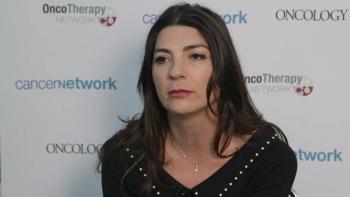
This interview examines the use of KIR genotyping during donor selection and its association with improved outcomes in patients undergoing allogeneic hematopoietic stem cell transplantation.

Complete response at 30 months (CR30) may be a useful surrogate endpoint for progression-free survival in trials of first-line follicular lymphoma treatments.

Patients with CML who have higher proportions of natural killer immune cells, and more mature natural killer cells, fare better when discontinuing therapy with imatinib.

This look ahead at hematologic malignancies in 2017 focuses on new agents being studied for the treatment of acute leukemias, myelodysplastic syndromes, and chronic lymphocytic leukemia.

This look ahead at hematologic malignancies in 2017 focuses on new agents being studied for the treatment of multiple myeloma, Hodgkin lymphoma, non-Hodgkin lymphoma, and myeloproliferative neoplasms.

Prenatal infection with cytomegalovirus increases the risk of childhood acute lymphoblastic leukemia, indicates a study of newborn blood and pretreatment childhood bone marrow published in the journal Blood.

I currently have a 77-year-old non-Hodgkin lymphoma patient that recently started bendamustine/rituximab combination therapy. After increasing the intravenous rituximab rate per protocol, she developed chills.
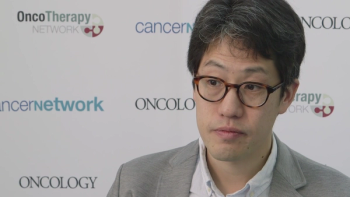
In this interview we discuss advances in the relationship between the microbiome and outcomes after allogeneic transplant, including graft-vs-host disease and relapse.
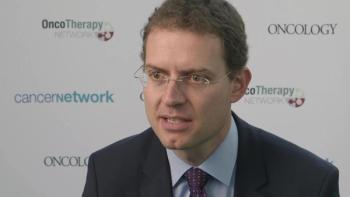
This video examines different mutational profiles of therapy-related myeloid neoplasms and how they can affect approaches to treatment.

For the first time, a study shows that using an immunomodulatory agent as maintenance therapy prolongs progression-free survival for patients with diffuse large B-cell lymphoma after first-line treatment with rituximab plus CHOP.

A study of pediatric acute lymphoblastic leukemia (ALL) has identified IKZF1 as a new ALL predisposition gene that may play a role both in leukemia pathogenesis and treatment responsiveness.

Newer cancer drugs are being approved on the basis of shorter studies and on outcomes that might not predict living longer or feeling better.

Ibrutinib can be safely combined with lenalidomide and rituximab in patients with relapsed or refractory diffuse large B-cell lymphoma, according to a new study presented at the American Society of Hematology 58th Annual Meeting and Exposition, held December 3–6.
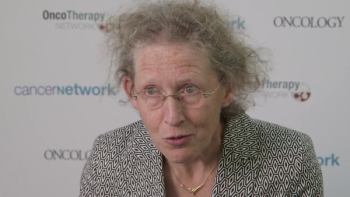
This interview examines treatment-related cardiotoxicity and the risk of second malignancy in patients with Hodgkin lymphoma.
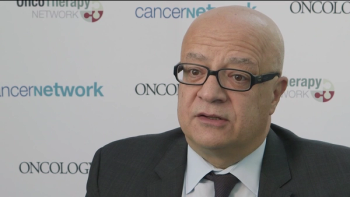
This interview examines a study that looked at the health-related quality of life of multiple myeloma patients in a real-world setting who underwent maintenance therapy after autologous stem cell transplant.